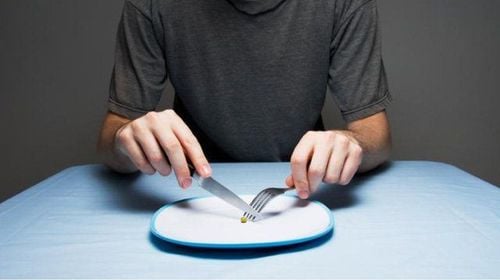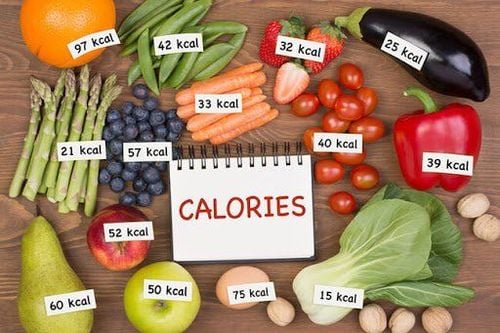This is an automatically translated article.
You can find a lot of information about the unproven benefits of fasting, from flushing "toxins" out of the body to eliminating fat in 30 days. In fact, fasting, i.e. eating little or no food, will lead to weight loss, at least in the short term. But it also has risks to human health. So how many days can a person fast? Find out more about this in the article below.1. What is long-term fasting?
Food and water are essential for human life. Your body needs energy from food and hydration from water to function properly. Many systems in your body function optimally with a varied diet and daily water intake.But our body can also survive for days without water. We can go days or sometimes weeks without food because of the adjustments to our metabolism and energy consumption.
2. Why does the interval change?
Being able to live for days and weeks without food and water seems like a no-brainer to many of us. After all, a day of fasting or even going for hours without food and water can leave many of us irritable and low on energy.Your body actually corrects itself if you fast for short periods of time or cannot access food and water for very long periods of time. This allows people to participate in religious diets and even try "fasting" diets as dietary methods without causing irreparable harm to their bodies.
It takes about 8 hours without eating for the body to change the way it works. Before that, it acted as if you were eating regularly. Under normal circumstances, your body breaks down food into glucose. Glucose provides energy for the body. When your body doesn't have access to food for 8 to 12 hours, your sugar stores will run out. Your body will begin to convert glycogen from the liver and muscles into glucose.

Mất khoảng 8 giờ không ăn để cơ thể thay đổi cách vận hành
The more fat a person stores, the longer a person can usually survive periods of starvation. Once the fat stores have been completely metabolized, the body will go back to the process of breaking down muscle for energy, since this is the only source of fuel left in the body.
You will begin to experience severe adverse symptoms during the starvation phase when your body is using stored muscles for energy. A study in the British Medical Journal Trusted Source states that people who are on a hunger strike should be closely monitored for serious side effects of starvation after losing 10 percent of their body weight. Very serious conditions occur when a person loses 18% of their body weight.
3. Why does the amount of water affect this?
You're more likely to survive starvation for weeks - and possibly months - if you can consume a healthy amount of water. Your body has more reserves to replace food than liquid. Your kidney function will decline within a few days if you do not drink enough water.According to an article, there are people who are bedridden who can survive 10 to 14 days without food and water. Some longer durations have been noted, but are less common. Remember that bedridden people don't use as much energy as healthy, moving people.
A study of hunger strikes suggested that a person needs to drink at least 1.5 liters of water per day to be able to survive hunger for a longer period of time. Research also suggests adding half a teaspoon of salt per day to water to support kidney function..

Một nghiên cứu về các cuộc tuyệt thực đã gợi ý rằng một người cần uống ít nhất 1,5 lít nước mỗi ngày để có thể sống sót trong tình trạng đói trong một thời gian dài hơn
4. How the body fights hunger
The human body's resilience to live without nourishment is impressive, as your stores of sugar — what your body normally uses as its main source of energy — will run out within a day. since not eating.After a day without food, your body releases a hormone called glucagon, which stimulates the liver to make glucose (a process called gluconeogenesis). This glucose is used mainly to feed the brain. On the other hand, your muscles rely on fatty acids produced from the breakdown of adipose tissue (fat) for fuel. About two or three days of fasting, this will become your body's main source of fuel.
Finally, fatty acids are used to form ketone bodies in the liver. They are released into the bloodstream and used by the brain for fuel, significantly reducing the brain's need for glucose. The liver's shift to producing ketones is what allows humans to survive without food.
Once fatty acid reserves are exhausted, the only fuel source available is protein (from your muscles). As protein breakdown accelerates, loss of cardiovascular, renal, and hepatic function leads to death.
5. How many days can a person fast?
Giving up food and water for a substantial period is also known as starving. Your body may go hungry after a day or two without food or water. At that time, the body begins to work differently to reduce the amount of energy burned. Ultimately, it leads to death.There is no “rule” for how long you can live without food. There is a lack of scientific research on hunger because it is now considered unethical to study hunger in human subjects.
There are a number of studies that explore older research on famine, as well as examine more recent famines in the real world. These circumstances include hunger strikes, religious fasts, and other situations.
An article in Archiv Fur Kriminologie Trusted Source states that the body can survive from 8 to 21 days without food and water and up to 60 days with adequate hydration.
Today's hunger strikes have provided insight into hunger. A study in the British Medical Journal cited several hunger strikes that ended after 21 to 40 days. These hunger strikes ended because of the severe, life-threatening symptoms the participants were experiencing.
There seems to be a certain "minimum" number on the body mass index (BMI) scale for survival. According to the journal Nutrition, men with a BMI below 13 and women with a BMI below 11 cannot sustain life.
An article in the British Medical Journal concluded that people of normal weight lost a faster ratio of body weight to muscle tissue than obese people when they fasted for the first three days. According to the Journal of Nutrition, women's body composition makes them able to endure hunger longer.

Không có “quy tắc” nào cho việc bạn có thể sống được bao lâu mà không có thức ăn
6. Risks of long-term fasting
Living without access to food and water can have adverse effects on your body. Many systems in your body will begin to deteriorate even though your body is likely to go on for days and weeks without food and water. Death is the general result of lack of food. There are many complications that occur due to starvation and the number of affected systems in the body increases with weight lossSome of the side effects of starvation include:
Fatigue Dizziness Low blood pressure Low blood pressure heart slows low blood pressure Muscle weakness Dehydration Thyroid problems Abdominal pain Low potassium Body temperature fluctuations Stress after trauma or depression Heart attack Organ failure Bone loss (osteoporosis) Weak and emaciated muscles Feelings feeling cold Hair thinning or loss Dry skin Constipation Loss of menstrual periods (amenorrhea) Fatigue, shortness of breath and paleness due to anemia People who have been hungry for a long time are unable to start consuming normal amounts of food right away. The body needs to be relaxed very slowly in order to eat and drink again to avoid adverse reactions, known as appetite syndrome, which include:
Heart conditions Nervous conditions Swelling of the body's tissues Continue eating after Hunger will require a doctor's supervision and may involve eating boiled vegetables, lactose-free foods, and a low-protein, low-sugar diet.

Sống mà không được tiếp cận với thức ăn và nước uống có thể có những tác động bất lợi cho cơ thể của bạn
Please dial HOTLINE for more information or register for an appointment HERE. Download MyVinmec app to make appointments faster and to manage your bookings easily.
Reference source: healthline.com; verywellhealth.com












